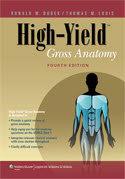High-Yield™ Gross Anatomy, Fourth Edition provides the essential information needed for USMLE Step 1 review and course
study. It is written from a clinical perspective to prepare students for clinical vignettes on the USMLE and thoroughly
illustrated with drawings and radiographic images.
This edition includes new tables on upper and lower extremity innervation. Images have been placed closer to the
appropriate text, and keys in legends have been replaced by full labels on images. Many of the CTs and MRIs have been
enlarged. Paragraphs of text are more concise.
Preface
1. Vertebral Column
I. The Vertebral Column
II. Curves
III. Joints
IV. Vasculature of the Vertebral Column
V. Clinical Considerations
VI. Normal Radiology
2. Spinal Cord and Spinal Nerves
I. Components of the Spinal Cord
II. Meninges and Spaces
III. Arterial Supply of the Spinal Cord
IV. Components of a Spinal Nerve
V. Dermatomes
VI. Clinical Procedures
VII. Clinical Considerations
3. Autonomic Nervous System
I. General Features of the Nervous System
II. Sympathetic Division of the ANS (Thoracolumbar)
III. Parasympathetic Division of the ANS (Craniosacral)
IV. Summary Table of Sympathetic and Parasympathetic Motor Actions
4. Lymphatic System
I. Central Lymphatic Drainage
II. Summary Diagram of Specific Lymphatic Drainage
5. Chest Wall
I. General Features of the Thorax
II. Bones of the Thorax
III. Muscles of the Thorax
IV. Movement of the Thoracic Wall
V. Arteries of the Thorax
VI. Veins of the Thorax
VII. Nerves of the Thorax
VIII. Breast
IX. Anterior Chest Wall
X. Lateral Chest Wall
XI. Posterior Chest Wall
XII. Mediastinum
XIII. Radiology
6. Pleura, Tracheobronchial Tree, and Lungs
I. Pleura
II. Tracheobronchial Tree
III. Lungs
IV. Clinical Considerations
V. Cross-sectional Anatomy
7. Heart
I. The Pericardium
II. Heart Surfaces
III. Heart Borders
IV. Fibrous Skeleton of the Heart
V. Valves and Auscultation Sites
VI. Arterial Supply of the Heart
VII. Venous Drainage of the Heart
VIII. The Conduction System
IX. Innervation of the Heart
X. Gross Anatomy of the Heart
XI. Clinical Considerations
XII. Radiology
8. Abdominal Wall
I. Abdominal Regions
II. Clinical Procedure
III. Inguinal Region
IV. The Scrotum
9. Peritoneal Cavity
I. Peritoneal Cavity
II. Omentum
III. Intraperitoneal and Extraperitoneal Viscera
IV. Clinical Considerations
10. Abdominal Vasculature
I. Abdominal Aorta
II. Venous Drainage of the Abdomen
III. Hepatic Portal System
11. Abdominal Viscera
I. Esophagus II. Stomach III. Duodenum IV. Jejunum V. Ileum VI. Innervation of the Small Intestine VII. Large Intestine
VIII. Innervation of the Large Intestine
IX. Appendix
X. Gallbladder
XI. Extrahepatic Biliary Ducts
XII. Liver
XIII. Pancreas
XIV. Cross-sectional Anatomy
XV. Radiology
12. Sigmoid Colon, Rectum, and Anal Canal
I. Sigmoid Colon
II. Rectum
III. Anal Canal
IV. Defecation Reflex
V. Radiology
13. Spleen
I. General Features
II. Arterial Supply
III. Venous Drainage
IV. Clinical Considerations
V. Radiology
14. Kidney, Ureter, Bladder, and Urethra
I. General Features
II. Kidney Surface Projections
III. Internal Macroscopic Anatomy of the Kidney
IV. Arterial Supply
V. Venous Drainage
VI. Innervation
VII. Clinical Considerations of the Kidney
VIII. Ureter
IX. Urinary Bladder
X. Urethra
XI. Radiology
15. Suprarenal (Adrenal) Glands
Abbreviated Table of Contents


